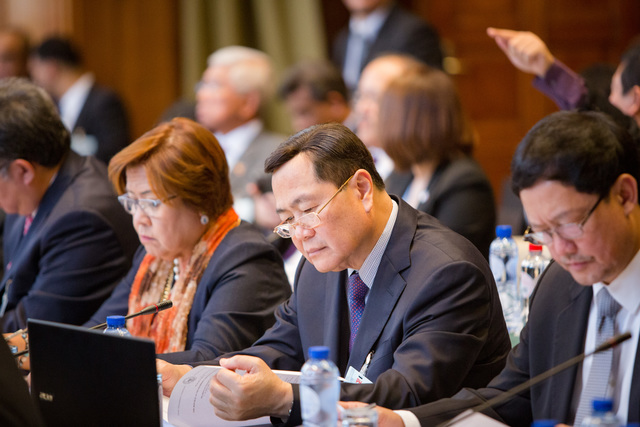Supreme Court Senior Associate Justice Antonio Carpio says China's global ambitions will make it costly for Beijing to defy an international arbitration ruling favoring the Philippines

'SAVING FACE.' Philippine Supreme Court Senior Associate Justice Antonio Carpio says Beijing cannot afford to defy an international ruling on the South China Sea arbitration case. Photo by Ayee Macaraig/Rappler
China's plan to become a leading world power will force it to comply with an international ruling potentially favoring the Philippines in the South China Sea dispute.
Philippine Supreme Court Senior Associate Justice Antonio Carpio made the statement as he addressed questions on the viability of Manila's strategy to take China to court without an enforcement mechanism.
In a media forum on Thursday, November 5, the legal scholar said Beijing cannot afford to defy a ruling from the United Nations-backed arbitral tribunal because of its ambitions of becoming the dominant Pacific power.
“China needs the world to survive,” Carpio said.
He added: “China needs ASEAN so they can start with their Maritime Silk Road, which passes through the South China Sea. China needs the rest of the world in their One Belt, One Road plan. They need our support for their Asian Infrastructure Investment Bank. Why will these countries support China if China is grabbing their maritime zones?”
Carpio was referring to China's various initiatives to assert its economic and political clout.
Under the so-called “One Belt, One Road” initiative, China aims to create a modern Silk Road Economic Belt and a 21st Century Maritime Silk Road that will boost trade. The strategy involves focusing on infrastructure development through Central Asia, and expanding maritime shipping routes through the Indian Ocean and the Persian Gulf.
The Chinese-led Asian Infrastructure Investment Bank is seen as a rival to the US-dominated World Bank to help Beijing hold sway in multilateral institutions.
Carpio was the speaker at the forum of the Asian Institute of Journalism and Communication to discuss the tribunal's initial ruling on October 29. The Hague-based tribunal decided it has the power to hear half of the Philippine claims, and to proceed to the merits of the case. Hearings are set on November 24 to 30.
China said it will not accept any ruling from the tribunal but Carpio believes Beijing will eventually heed the final decision expected to be released in mid-2016.
“I think in the end, China will comply because it is to its advantage to comply. It will take time. Once we win, do not expect instant gratification. We will have another struggle to convince the world to support us,” the magistrate said.
In a previous interview with Rappler, Carpio said it could take 10 years for China to comply with a ruling favorable to the Philippines.
Manila is asking the tribunal to strike down China's 9-dash line as inconsistent with the United Nations Convention on the Law of the Sea (UNCLOS). Both the Philippines and China are parties to the treaty.
China uses the 9-dash line to claim “indisputable sovereignty” over almost the entire South China Sea, a vital waterway through which a third of world trade passes every year.

HAGUE HEARINGS. Members of the Philippine Delegation at The Hague, including: Former Secretary of Justice Leila De Lima; Justice Antonio Carpio, and Deputy Executive Secretary for Legal Affairs of the Philippines Menardo Guevarra.
'Reclamation can't be ownership'
Carpio reiterated that “reputational damage” or losing face in the world stage will make China comply with the ruling in the long term.
“When the cost of non-compliance far exceeds the cost of compliance, then the state will comply. In the case of the Philippines, we are not alone. A ruling in our favor will be immensely beneficial to Vietnam, Malaysia, Brunei and Indonesia so we have lots of supporters,” he said.
Vietnam, Malaysia, Brunei, and Taiwan also have claims to the South China Sea while China's 9-dash line runs through a portion of Indonesia's Natuna Islands.
Beyond the region, the magistrate said other world powers support the Philippines' legal tack.
“Even the US, EU, and Canada came out with statements that arbitration is a peaceful settlement of dispute, and they support it. They are not saying they support our claim but they are saying our approach is the proper approach,” he said.
The Philippines resorted to arbitration as a last option as China grows increasingly assertive over its claims. In the last two years, Beijing conducted massive reclamation and created artificial islands in features within the Philippines' 200 nautical-mile exclusive economic zone.
China also seized rocks and shoals from other claimant countries in the past decades.
Carpio said the international community does not sanction illegal occupation.
“Under the UN charter, you cannot seize land or territory by aggression. If you occupy it with the use of threat or force, that's illegal. No matter how long you occupy it, it does not ripen into ownership.
That's why what we're trying to do is for the tribunal to say Mischief Reef is part of our continental shelf. Only the Philippines can create artificial islands there,” he said.
“If the tribunal agrees with us, the act of China will be illegal and never ripen into ownership.”
'China's face-saving exit'
Carpio is confident that the Philippines will win the case because of legal scholars' consensus that the 9-dash line has no basis in international law.
China has not clarified the meaning of the 9-dash line, nor has it provided fixed coordinates. Yet Carpio said Beijing's actions show how it interprets the line.
“That's the meaning of adjacent, relevant waters [for China]. China claims sovereignty to all the waters, fisheries, seabed, and subsoil enclosed by the 9-dash line,” he said.
Carpio said one option for China is to adopt Taiwan's position on the 9-dash line.
“If China really wants to come out with a face-saving exit because they know this decision is coming against them, they can adopt what Taiwan President Ma Ying-jeou said that the 9-dash line is a claim to islands within the lines, not to the entire waters, and whatever the maritime zones allow those islands under UNCLOS," he said.
Carpio said changing China's stance will align its claim with international law.
“What we cannot accept is China will say they own the entire sea since the ancient times without showing historical records. If China can align with the Ma interpretation, that would be great. That's livable," he added.

No comments:
Post a Comment
Note: Only a member of this blog may post a comment.